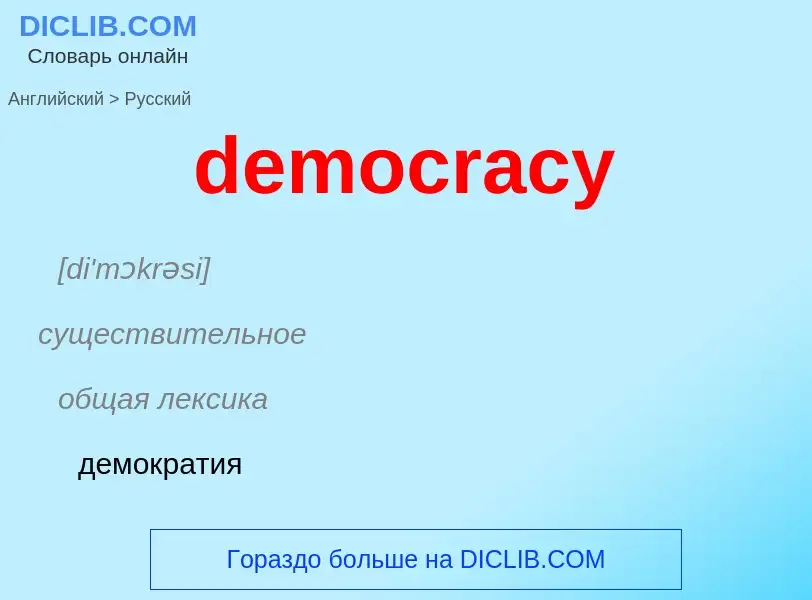Tradução e análise de palavras por inteligência artificial ChatGPT
Nesta página você pode obter uma análise detalhada de uma palavra ou frase, produzida usando a melhor tecnologia de inteligência artificial até o momento:
- como a palavra é usada
- frequência de uso
- é usado com mais frequência na fala oral ou escrita
- opções de tradução de palavras
- exemplos de uso (várias frases com tradução)
- etimologia
Democracy - tradução para Inglês
[di'mɔkrəsi]
существительное
общая лексика
демократия
демократизм
демократическое государство
демократическая страна
демократическая партия
политика демократической партии
американизм
(Democracy)
собирательное выражение
простые люди
синоним
Definição
Wikipédia
Democracy (from Ancient Greek: δημοκρατία, romanized: dēmokratía, dēmos 'people' and kratos 'rule') is a form of government in which the people have the authority to deliberate and decide legislation ("direct democracy"), or to choose governing officials to do so ("representative democracy"). Who is considered part of "the people" and how authority is shared among or delegated by the people has changed over time and at different rates in different countries. Features of democracy often include freedom of assembly, association, property rights, freedom of religion and speech, inclusiveness and equality, citizenship, consent of the governed, voting rights, freedom from unwarranted governmental deprivation of the right to life and liberty, and minority rights.
The notion of democracy has evolved over time considerably. Throughout history, one can find evidence of direct democracy, in which communities make decisions through popular assembly. Today, the dominant form of democracy is representative democracy, where citizens elect government officials to govern on their behalf such as in a parliamentary or presidential democracy.
Prevalent day-to-day decision making of democracies is the majority rule, though other decision making approaches like supermajority and consensus have also been integral to democracies. They serve the crucial purpose of inclusiveness and broader legitimacy on sensitive issues—counterbalancing majoritarianism—and therefore mostly take precedence on a constitutional level. In the common variant of liberal democracy, the powers of the majority are exercised within the framework of a representative democracy, but the constitution and a supreme court limit the majority and protect the minority—usually through securing the enjoyment by all of certain individual rights, e.g. freedom of speech or freedom of association.
The term appeared in the 5th century BC in Greek city-states, notably Classical Athens, to mean "rule of the people", in contrast to aristocracy (ἀριστοκρατία, aristokratía), meaning "rule of an elite". Western democracy, as distinct from that which existed in antiquity, is generally considered to have originated in city-states such as those in Classical Athens and the Roman Republic, where various schemes and degrees of enfranchisement of the free male population were observed before the form disappeared in the West at the beginning of late antiquity. In virtually all democratic governments throughout ancient and modern history, democratic citizenship was initially restricted to an elite class, which was later extended to all adult citizens. In most modern democracies, this was achieved through the suffrage movements of the 19th and 20th centuries.
Democracy contrasts with forms of government where power is either held by an individual, as in autocratic systems like absolute monarchy, or where power is held by a small number of individuals, as in an oligarchy—oppositions inherited from ancient Greek philosophy. Karl Popper defined democracy in contrast to dictatorship or tyranny, focusing on opportunities for the people to control their leaders and to oust them without the need for a revolution. World public opinion strongly favors democratic systems of government. According to the V-Dem Institute and Economist Intelligence Unit democracy indices, less than half the world's population lives in a democracy as of 2021. Democratic backsliding with a rise in hybrid regimes has exceeded democratization since the early to mid 2010s.


![King [[Charles III]], a constitutional monarch King [[Charles III]], a constitutional monarch](https://commons.wikimedia.org/wiki/Special:FilePath/Charles Prince of Wales.jpg?width=200)
![[[Corazon Aquino]] taking the Oath of Office, becoming the first female president in Asia [[Corazon Aquino]] taking the Oath of Office, becoming the first female president in Asia](https://commons.wikimedia.org/wiki/Special:FilePath/Corazon Aquino inauguration.jpg?width=200)
.jpg?width=200)
![liberal democracies]] today. liberal democracies]] today.](https://commons.wikimedia.org/wiki/Special:FilePath/John Locke.jpg?width=200)
![A [[Landsgemeinde]] (in 2009) of the [[canton of Glarus]], an example of direct democracy in Switzerland A [[Landsgemeinde]] (in 2009) of the [[canton of Glarus]], an example of direct democracy in Switzerland](https://commons.wikimedia.org/wiki/Special:FilePath/Landsgemeinde Glarus, 2009.jpg?width=200)
![[[Magna Carta]], 1215, England [[Magna Carta]], 1215, England](https://commons.wikimedia.org/wiki/Special:FilePath/Magna Carta (British Library Cotton MS Augustus II.106).jpg?width=200)
![Meeting of the Grand Committee of the [[Parliament of Finland]] in 2008 Meeting of the Grand Committee of the [[Parliament of Finland]] in 2008](https://commons.wikimedia.org/wiki/Special:FilePath/Nordiska radets presidium haller mote med de nordiska statsministrarna under session i Helsingfors 2008-10-28.jpg?width=200)
![The number of nations 1800–2003 scoring 8 or higher on [[Polity IV]] scale, another widely used measure of democracy The number of nations 1800–2003 scoring 8 or higher on [[Polity IV]] scale, another widely used measure of democracy](https://commons.wikimedia.org/wiki/Special:FilePath/Number of nations 1800-2003 scoring 8 or higher on Polity IV scale.png?width=200)

![Berne]]'s citizen in November 2008 about 5 national, 2 cantonal, 4 municipal referendums, and 2 elections (government and parliament of the City of Berne) to take care of at the same time. Berne]]'s citizen in November 2008 about 5 national, 2 cantonal, 4 municipal referendums, and 2 elections (government and parliament of the City of Berne) to take care of at the same time.](https://commons.wikimedia.org/wiki/Special:FilePath/Swiss voting material.jpg?width=200)
